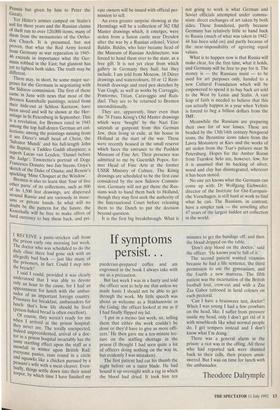If symptoms persist. . .
I RECEIVE a panic-stricken call from the prison early one morning last week. The doctor who was scheduled to do the daily clinic there had gone sick with an allegedly bad back — just like many of the prisoners, in fact. Could I step into the breach?
I said I could, provided it was clearly understood that I was able to devote only an hour to the cause, for I had an appointment for lunch with the ambas- sador of an important foreign country. Prisoners for breakfast, ambassadors for lunch: that's how life should be lived (Prison-baked bread is often excellent).
Of course, they weren't ready for me When I arrived at the prison hospital: they never are. The totally unexpected, indeed unprecedented, arrival of a doc- tor in a prison hospital invariably has the same startling effect upon the staff as a snowfall in winter upon British Rail: everyone panics, runs round in a circle and squawks like a chicken pursued by a peasant's wife with a meat-cleaver. Even- tually, things settle down into their usual torpor, by which time I have finished my
paederast-prepared coffee and am engrossed in the book I always take with me as a precaution.
But last week I was in a hurry and told the officer sent to help me that unless we made haste I should not be able to get through the work. My little speech was about as welcome as a Stakhanovite in the Gulag: the officer looked at me as if I had finally flipped my lid.
'I put in a memo last week, sir, telling them that either the work couldn't be done or they'd have to give us more offi- cers.' He then gave me a ten-minute lec- ture on the staffing shortage in the prison (I thought I had seen quite a lot of officers doing nothing on the way in, but evidently I was mistaken).
The first patient had cut his thumb the night before on a razor blade. He had bound it up overnight with a rag in which the blood had dried. It took him ten minutes to get the bandage off, and then the blood dripped on the table.
'Don't drip blood on the doctor,' said the officer. 'He knows you're full of it.'
The second patient wanted vitamins because he had a life sentence, the third permission to use the gymnasium, and the fourth a new mattress. The fifth patient was the incarnation of the British football lout, crew-cut and with a Zsa Zsa Gabor tattooed in lurid colours on each pectoral.
'Can I have a brainwave test, doctor? When I was young I had a few crowbars on the head, like. I suffer from pressure inside my head, only I don't get rid of it with nosebleeds like what normal people do, I get tempers instead and I don't know what I'm doing.'
There was a general alarm in the prison: a riot was in the offing. All those who had reported sick were shunted back to their cells, their prayers unan- swered. But I was on time for lunch with the ambassador.
Theodore Dalrymple


















































 Previous page
Previous page